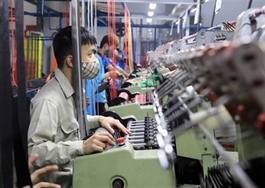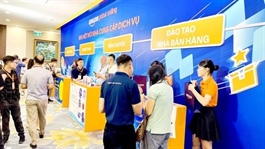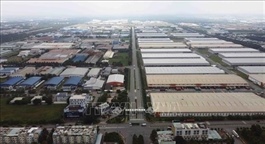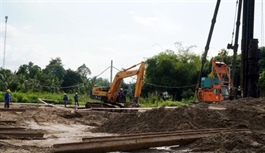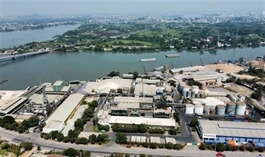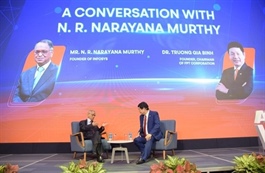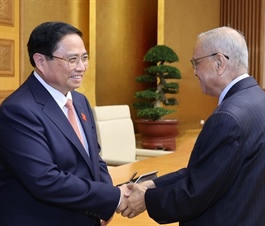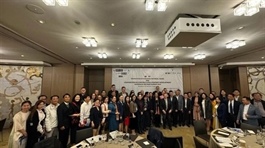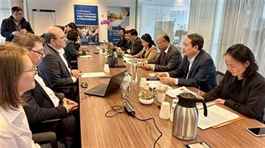Vietnam continues to promote political stability for long-term growth: Deputy PM
Vietnam continues to promote political stability for long-term growth: Deputy PM
The Vietnamese Government remains committed to helping investors overcome challenges, turn risks into opportunities, and achieve rapid and sustainable development.
Vietnam is intensifying its efforts to build a clean and strong Party and to combat wrongdoings and negative behaviors, maintaining the benefits of political stability.
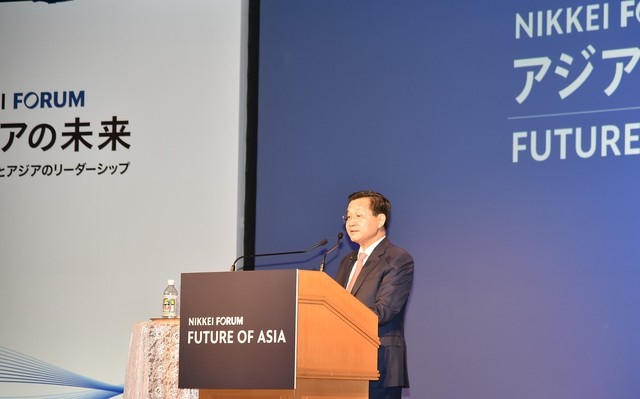
Deputy Prime Minister Le Minh Khai at the forum. Photos: Tran Manh |
Deputy Prime Minister Le Minh Khai shared the view at the 29th Future of Asia Forum in Tokyo on May 23 under the theme “Asia Leadership in an Uncertain World.”
Khai said that Vietnam is entering a new phase of development with a vision to become a developed nation by 2045. To achieve this, Vietnam is focusing on three strategic breakthroughs: economic institutions, infrastructure, and human resources.
“The country is committed to building an independent and self-sufficient economy while actively engaging in deep, substantial, and effective international integration. Vietnam also pursues a foreign policy of independence and self-reliance, aimed at peace, friendship, cooperation, and development, with a focus on multilateralism and diversification,” Khai continued.
Turning to the business community, he emphasized Vietnam's commitment to facilitating and protecting the legitimate rights and interests of enterprises, maintaining macroeconomic stability, and ensuring adequate electricity supply for production and business, in line with a just energy transition and emission reduction.
“The Vietnamese Government will always accompany investors in overcoming challenges, turning risks into opportunities, and achieving rapid and sustainable development,” he noted.
Building on the “Comprehensive Strategic Partnership for Peace and Prosperity in Asia and the World” between Vietnam and Japan, he urged the business communities of both countries to actively explore new partnership frameworks, strengthen economic linkages, ensure economic security, and build stable supply chains.
With the message that Vietnam is part of the "Asian family," Khai expressed a desire to further consolidate Vietnam's role as a good friend, reliable partner, and responsible member of the region and the international community.
He expressed his confidence that Asia, with its core values of diversity, dynamism, and resilience, will continue to make significant strides, write new success stories, and fulfill its mission in the 21st century.
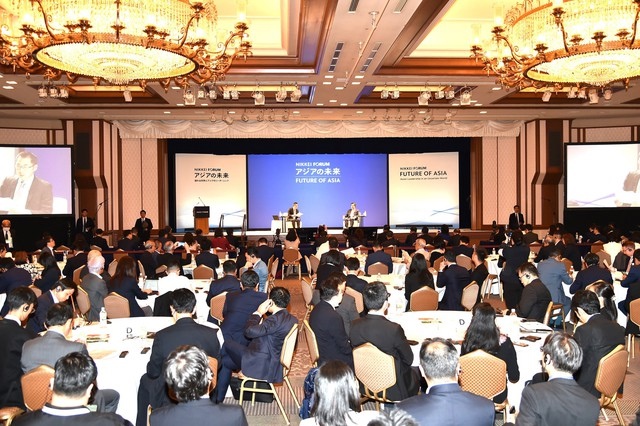
Overview of the forum. |
Vietnam remains part of Asia’s development
Discussing Asia's role and potential, Deputy Prime Minister Le Minh Khai noted that Asia remains a dynamic and stable growth region. Over the past three decades, Asia has overcome crises, turned challenges into opportunities, and emerged stronger, becoming a development model with pioneers leading in many new fields.
He shared that Vietnam is proud to be part of Asia's overall development, noting the country has made remarkable transformations and serves as a model in several key development aspects.
The Vietnamese economy has experienced significant qualitative and quantitative improvements, ensuring social welfare and equity. In foreign relations, Vietnam stands as a model in international relations history for its progress, reconciliation, post-war recovery, and comprehensive international integration.
To enhance Asia's future role, Khai proposed "three guarantees" and "three enhancements." The three guarantees include the guarantee of a peaceful and stable environment for cooperation and development, respecting the UN Charter and international law, especially the 1982 UNCLOS, and the guarantee that the benefits of free trade and investment are widely and equitably distributed among nations. He also emphasized international cooperation, multilateralism, and a comprehensive approach to addressing common challenges.
The three enhancements are adaptability, resilience, and efficient resource use to drive new growth engines in green and digital economies.
He called for greater business cooperation, cultural exchanges, and tourism. Specifically, Khai highlighted the potential for Asia to showcase its rich cultural traditions to the international community through increased tourism and cultural exchanges within and beyond the region.
This year's conference was attended by many of the region's national leaders, business communities, and distinguished academics, including the Prime Ministers of Japan, Malaysia, and Thailand, the Speaker of the Mongolian Parliament, and the Deputy Prime Ministers of Cambodia and Singapore.
Leaders at the conference assessed that the world is facing profound and far-reaching transformational challenges. The global economy is entering a difficult and uncertain period with many rising risks. In this context, leaders stressed the need for Asia to maintain a peaceful and stable environment for development and to promote growth drivers in trade, investment, the green economy, and the digital economy.
Many speakers stressed the need for Asian countries to maintain a neutral and balanced relationship with the major powers in the face of increasing strategic competition. The conference reaffirmed Asia's leadership role in addressing global challenges, capitalizing on its position as a growth engine and the center of many crucial economic linkages.
Since 2009, senior Vietnamese leaders have continuously participated in the Future of Asia conferences, contributing to Vietnam's image as an active and responsible member of the international community.
Deputy Prime Minister Le Minh Khai's participation in the 29th Future of Asia Conference reaffirmed Vietnam's commitment to strengthening its leadership role in Asia and conveyed the message of a dynamically developing economy and an increasingly favorable investment environment, ready to listen and respond to the contributions of the international business community.







